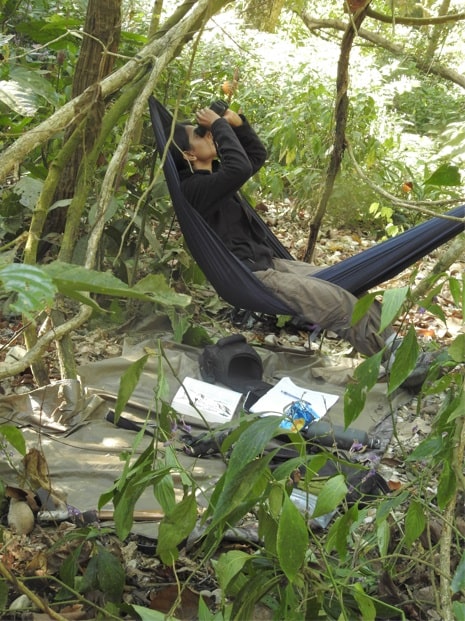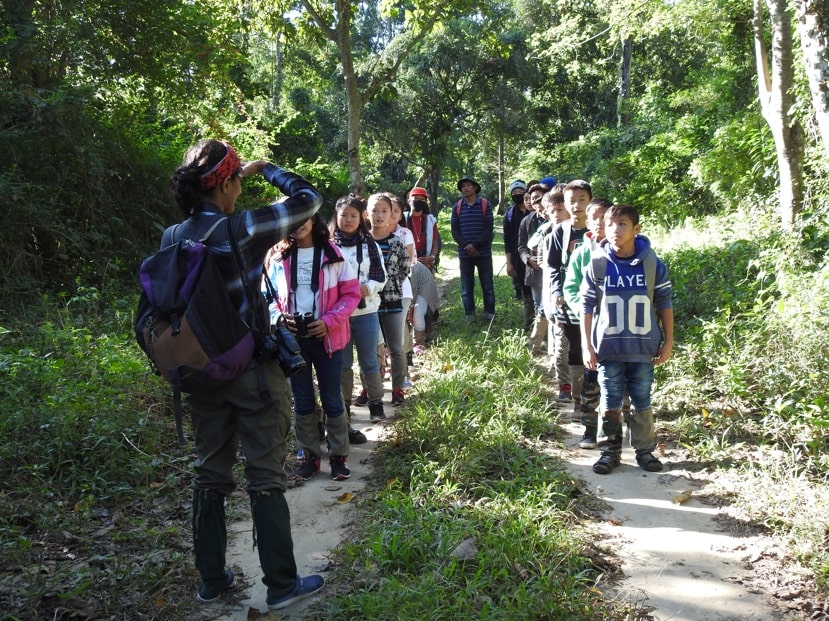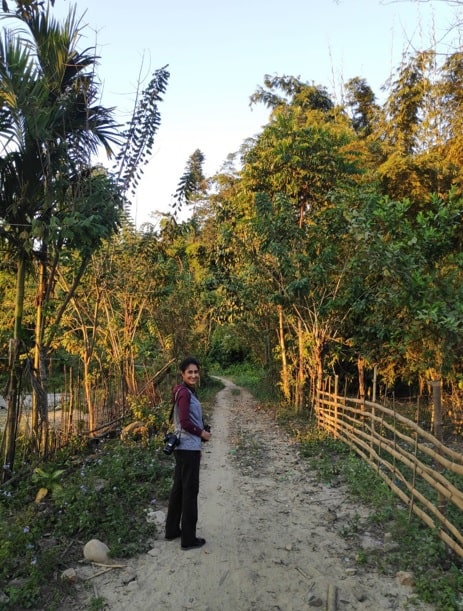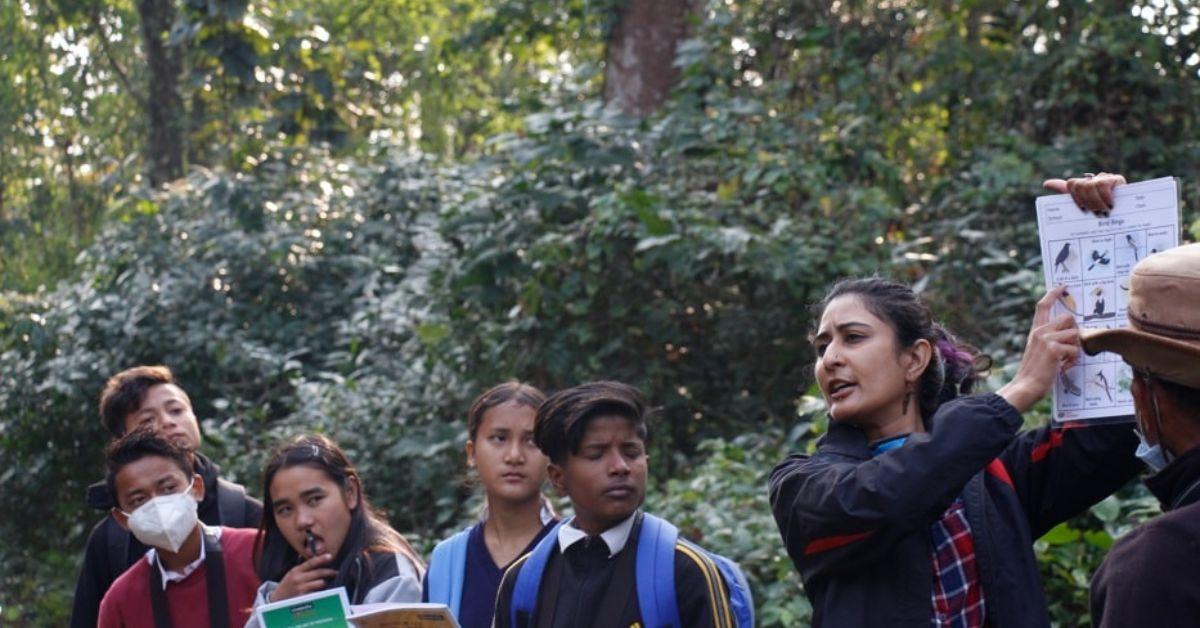Meet an Educator is a monthly series by Early Bird, where we feature the work of educators across India who are actively spreading the joy of birds and nature. Our first featured educator in the series is Saniya Chaplod, a nature educator who coordinates with schools in and around Pakke Tiger Reserve, Arunachal Pradesh, which includes taking kids for camping inside the tiger reserve.
I am from Ujjain (Madhya Pradesh) a city known for its temples, but I like to call it a city of these tiny fragments of green spaces with the beautiful river Kshipra flowing through it. I am an Aerospace engineer by academic qualification, but a wildlifer at heart. I shifted my field, to study and work for wildlife after my engineering. I haven’t looked back ever since. I have worked with various NGOs and Independent researchers in Chambal, Warangal, Srinagar (J&K) and Arunachal Pradesh.
I work at Nature Conservation Foundation and coordinate the Nature Education Program with schools in and around Pakke Tiger Reserve, Arunachal Pradesh. A major part of this includes taking kids camping inside the reserve for a few days every year. We also engage with them throughout the year via other activities through a structured program.
Are you a birder? What about birdwatching excites you?
I have been birding for 7 years, I wear my binocs like a regular necklace! I enjoy observing birds everywhere, be it from my balcony or when on the road travelling to my field site, and when I am working as well. I fell in love with birding during my work on frugivores where we used to sit under fruiting trees for hours studying plant-animal interactions. It was during this project that I realized the importance of patiently observing birds and not just ticking species off the list. I like everything about birding, especially when I can close my eyes and listen to different bird-calls instead of city noise. Lately I have been enjoying birding with my 6 year old neighbour in Ujjain.

When and how did you get interested in bird/nature education?
When I shifted careers I was interested in reptiles and other herps, and I still am. I used to go looking for snakes in agricultural fields near my home with my brother. I did not see many snakes there but started taking pictures of birds and realized that I could not even identify the most common birds. That’s when I got myself a field guide and started birding regularly. The next step for me was to pass on this excitement to my friends, family and people around me as I love to discuss nature, wildlife and birds with almost everyone I meet.
I got into the field of nature education when I worked for education & awareness programs for a project in the Chambal region. Since then I have been interested in nature education and I currently enjoy my engagement with school students in Pakke, Arunachal Pradesh
What do you hope to achieve through your education work?
Right now, I do not have any big plans for my education work. If I am able to get kids and adults excited about wildlife/plants or birds in specific, excited enough for them to start caring about their existence I will consider my job done. One thing I really like about our work through the Nature Education program in Pakke is that it focuses on long term engagement with kids and not on one-time experience.
Learning and teaching about nature gives me the much needed hope that we all struggle with in the field of wildlife conservation.
Why do you believe it is important for children to learn about birds or connect with nature?
Personally, I feel this is important, for various reasons:
- Birding is a very therapeutic activity. Something that really helps us take a breather in increasingly stressful times like this, not just for working adults but also students and children.
- High accessibility and satisfaction: Birds are everywhere. You do not have to necessarily go to a Tiger Reserve or sanctuary to watch birds. You can do so even from a park or street or even your balcony.
- A younger generation deeply connected with nature is our only hope against the challenges facing us.

What tools or resources have helped you in teaching about birds? Can you describe an approach that has worked exceptionally well for you?
While there are many tools, an Early Bird workshop that I attended a few years back, learning to be a ‘Birding Buddy’ really helped me with teaching about nature/birding. I also feel art is a very strong tool for connecting with Nature and wildlife.
Besides this, games, nature walks, and sometimes documentaries are also helpful. The excitement of watching a bird is often infectious and if the educator is excited about birding the learners get excited too.
Have you encountered a significant challenge as a bird/nature educator, how did you overcome it?
The recurring challenge I have faced is when I am leading larger groups, as it is hard to focus only on birding on our walks since kids get interested in many things in the forest. But I feel that as long as they are getting fascinated by something in the forest, it is still a win.
Any memorable moment or experience you have had in teaching kids about birds/nature. Can you recall any insightful instance that shaped your perspective?
Most of our walks and trails with students have had some or the other highlight but seeing kids getting excited about anything in nature, be it a beetle, a butterfly, a bird or an elephant gives me the motivation to keep going. During our nature camps inside the forest we do a reflection and sharing session at the end of each day. The kind of experiences that the kids share makes our effort worthwhile.
Have you noticed any changes in your learners after they received exposure to birds and nature-based learning?
We definitely see a lot of change in the students we interact with since we collect feedback before and after our camps for us to analyze on what works and what doesn’t. After the camps kids definitely feel more connected to nature with the sharing session as a testimony to how their perspectives change (even if temporarily, initially) so quickly with only a few interactions with the wild.
What message would you have for your fellow educators, or somebody starting out in their nature education journey?
There is no one way of connecting with nature and wildlife. I feel that we are all learners here and educating about nature is a two way process since we also learn something new or different each time from the kids we teach. One thing to note, especially as educators from cities doing awareness programs with kids living around forests, is that we need to remove the prejudice from our minds that we know better than them. In short, we need to be very careful of our inherent colonial overtones in Nature Education initiatives/programs.



We are longtime friends of Venky in the U.S. Where can we buy your artwork. Thank you. Doug & Bev Keil
Hi Doug and Bev, can you please share your email address? Mine is saniya@ncf-india.org.